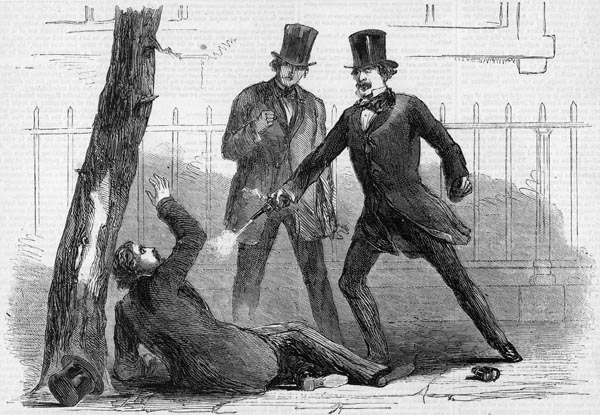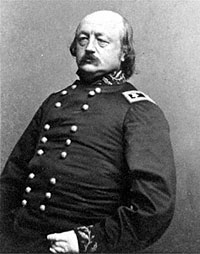Is Stephen Carter's The Impeachment of Abraham Lincoln Science Fiction?
What makes Stephen L. Carter’s The Impeachment of Abraham Lincoln mainstream historical fiction rather than science-fictional alternate history? Maybe nothing—the book deserves a Nebula nomination, given that other alternate histories have been nominated. Maybe it’s just the marketing that put the book on another shelf.
Carter writes better than most science fiction writers, but that should not disqualify him.
Carter also eschews a lot of hand-to hand combat, complex break-ins into secret chambers under the unfinished Washington Monument, dead-eyed Western riflemen, Chinese mandarins with elaborate diction, Himalayan religious devotions, Texans ensuring the independence of their republic, submarines, silk balloons made out of ladies’ underwear, steam-powered pogo sticks, locomotive-repairing gamines with adorable smudges of grease on their high cheekbones, and Mark Twain.
OK, so he’s just faking it. The man clearly doesn’t know a thing about alternate history.
He does know how to write a good story, though, and I had a great time with it. His point of view character is Abigail Canner, a young black woman from a high-status black family in Washington who wants to become a lawyer, and gets swept up in the shenanigans surrounding the impeachment of an Abraham Lincoln who survived the assassination attempt at Ford’s Theater (“He had been shot on Good Friday. On Easter Sunday, he rose.”)
There is much fun stuff about social life on either side of the color line (with “the many evil Mellison daughters” who taunt poor Abigail as particular standouts), legal researching, courting, politics, and corruption. A number of historical characters put in appearances, including James G. Blaine, our old “continental liar from the state of Maine” and William Tecumseh Sherman.
I can guess one thing about Stephen Carter, without ever having met him: he is not a scoundrel. Nor is he a scalawag, or a rogue. I doubt he is even a rascal.
And that’s too bad. Because to handle a man like Daniel Sickles, a major figure in the narrative, you had best have features of all of those, as well as those of a con man, a circus ringmaster, a military commander, a ward heeler, and a Don Juan. Sickles has claims on being more interesting even than my old favorite, Benjamin Butler, who also appears in the narrative, but only at a distance during the trial itself. Here Sickles is one of those characters writers can’t resist as describing as “colorful”, without really showing any signs of why anyone would think that. Instead of propositioning Abigail and then claiming she stole his wallet, he performs able service to the cause. Not that Sickles wasn’t able. He was just a lot of other things as well.

One of Sickles's achievements: killing his wife's lover (the son of Francis Scott Key) and getting away with it by a plea of temporary insanity--Edwin Stanton, future Secretary of War, was his lawyer
As was my old favorite, Benjamin Butler, who appears here only on the other side of the Senate floor, as a major prosecutor in the impeachment proceedings, as he was in the historical impeachment of Andrew Johnson that serves as its model. I wish Carter had brought him up close and personal, and not described him as tall and blond without noting that he was pudgy, squint-eyed, and balding.
 Did I hear someone say "no Adonis"?
Did I hear someone say "no Adonis"?
Actually, the ghost of Gore Vidal (a particular favorite of mine, though he became a major crank in his later years) hovers over this work. Carter ably handles the social maneuvers at parties, the closed-door negotiations, the gossip, and the naked lust for power that were all Vidalian fascinations. He even features Kate Sprague, Salmon P. Chase’s elegant daughter, who was a major character in Vidal’s superb, if much-debated, Lincoln.
And Lincoln was a major character in Vidal’s Lincoln. Carter treats him surprisingly gingerly, sticking mostly the comical stories Lincoln used to deflect opponents and conceal his goals. Carter admits to being worried about portraying this astonishing and perplexing man. But Lincoln is the focus of the story, not a major character.
But Carter does encumber his narrative with an overly complex alternate conspiracy in addition to the Congressional cabal that is seeking to impeach the President. As always, the requirements of the conspiracy plot eventually compete for vital character oxygen with the actual surface plot, Abigail’s relationship with her complicated family, the young lawyer who has an interest in her, and all the other characters who seek to help her, confuse her, or use her. Some key figures get shortchanged.
I think Carter should have trusted his characters and the clever situation he had created for them more. The maneuvers around the impeachment were quite enough to hold my interest. But even with that handicap, it was one of the most fun books I’ve read in quite a while. Highly recommended.